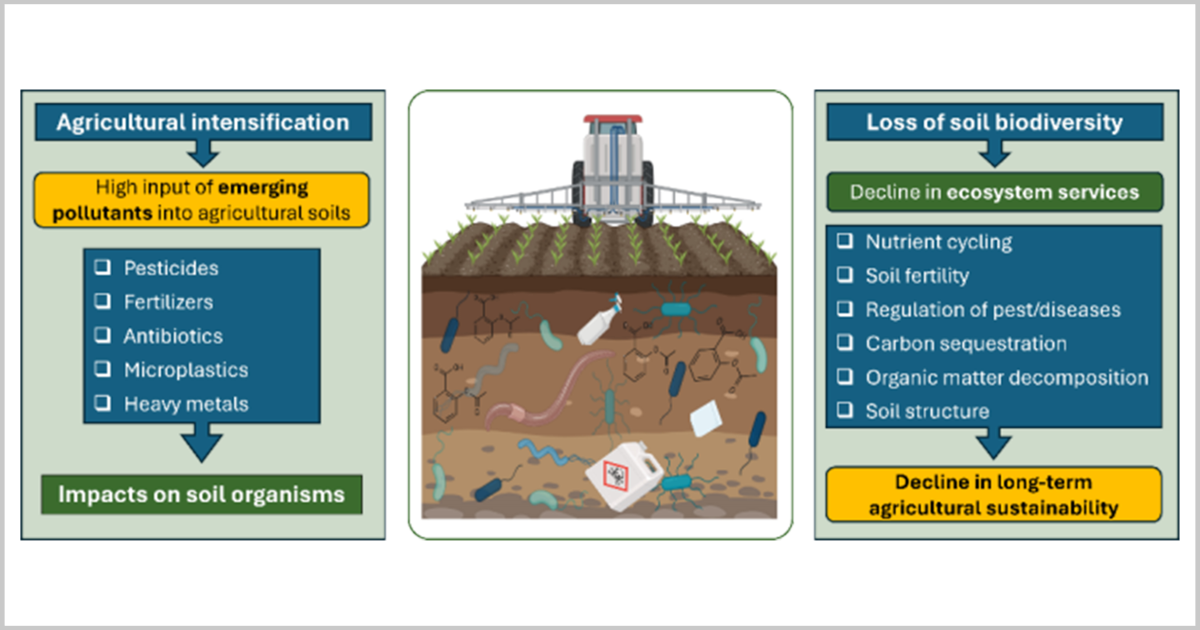Impacts of Emerging Agricultural Pollutants on Environmental Health
A special issue of Agriculture (ISSN 2077-0472). This special issue belongs to the section "Ecosystem, Environment and Climate Change in Agriculture".
Deadline for manuscript submissions: 30 November 2025 | Viewed by 1516

Special Issue Editors
Interests: pesticides; antibiotics; heavy metals; agricultural soils; risk assessment; sustainable agriculture; agricultural management practices; adsorption–desorption; transport
Interests: antibiotics; heavy metals; leucine incorporation technique; PICT; resistance; soil microbial communities; toxicity
Special Issues, Collections and Topics in MDPI journals
Interests: agricultural soils; industrial soils; heavy metals; lead; mining soils; plastic contamination; soil contamination; shooting ranges; urban soils
Special Issues, Collections and Topics in MDPI journals
Special Issue Information
Dear Colleagues,
Healthy agricultural soils are essential to maintaining food security in the face of a growing global population. However, the intensification of agricultural practices in recent decades has resulted in significant soil contamination, primarily due to the extensive use of synthetic chemical fertilizers and pesticides, as well as the increasing presence of emerging pollutants such as antibiotics, heavy metals, nanomaterials, microplastics, and per- and polyfluoroalkyl substances (PFASs), among others.
These emerging agricultural contaminants pose serious risks to soil ecosystems. They can disrupt soil biota across multiple trophic levels—including microorganisms (e.g., bacteria, archaea, fungi), mesofauna (e.g., nematodes, collembolans, mites), and macrofauna (e.g., earthworms, insects, mollusks)—leading to declines in soil biodiversity. This loss of biodiversity, in turn, compromises key ecosystem functions such as nutrient cycling, organic matter decomposition, nitrogen fixation, and carbon sequestration. These disruptions threaten not only soil health but also the long-term sustainability and resilience of agricultural systems.
In addition, emerging pollutants may exhibit phytotoxic effects, reducing plant growth and productivity. They can also migrate into adjacent ecosystems—such as surface and groundwater bodies—where they may harm aquatic organisms and potentially bioaccumulate in food webs, posing serious risks to environmental and human health.
Accordingly, this Special Issue invites submissions that address a) the effects of emerging agricultural pollutants on terrestrial and aquatic organisms; b) the effects of emerging agricultural pollutants on soil functions and essential ecosystem services for sustainable agriculture; and c) the transport, fate, and transformation of emerging pollutants within agroecosystems and their potential transfer across environmental compartments (e.g., soil–water–plant systems).
We welcome the submission of research and review articles, including theoretical and practical contributions, as well as case studies. All types of research, including studies reporting negative results, are encouraged to be submitted. All submissions will be subject to peer review prior to publication.
Dr. Manuel Conde Cid
Dr. Vanesa Santás-Miguel
Dr. Andrés Rodríguez-Seijo
Dr. Carla Cruz-Paredes
Guest Editors
Manuscript Submission Information
Manuscripts should be submitted online at www.mdpi.com by registering and logging in to this website. Once you are registered, click here to go to the submission form. Manuscripts can be submitted until the deadline. All submissions that pass pre-check are peer-reviewed. Accepted papers will be published continuously in the journal (as soon as accepted) and will be listed together on the special issue website. Research articles, review articles as well as short communications are invited. For planned papers, a title and short abstract (about 100 words) can be sent to the Editorial Office for announcement on this website.
Submitted manuscripts should not have been published previously, nor be under consideration for publication elsewhere (except conference proceedings papers). All manuscripts are thoroughly refereed through a single-blind peer-review process. A guide for authors and other relevant information for submission of manuscripts is available on the Instructions for Authors page. Agriculture is an international peer-reviewed open access semimonthly journal published by MDPI.
Please visit the Instructions for Authors page before submitting a manuscript. The Article Processing Charge (APC) for publication in this open access journal is 2600 CHF (Swiss Francs). Submitted papers should be well formatted and use good English. Authors may use MDPI's English editing service prior to publication or during author revisions.
Keywords
- agricultural soils
- ecological risk assessment
- soil biodiversity
- emerging pollutants
- pesticides
- microplastics
- antibiotics
- soil organisms
- aquatic organisms
- pollutant transport and fate
- adsorption–desorption
- phytotoxicity
Benefits of Publishing in a Special Issue
- Ease of navigation: Grouping papers by topic helps scholars navigate broad scope journals more efficiently.
- Greater discoverability: Special Issues support the reach and impact of scientific research. Articles in Special Issues are more discoverable and cited more frequently.
- Expansion of research network: Special Issues facilitate connections among authors, fostering scientific collaborations.
- External promotion: Articles in Special Issues are often promoted through the journal's social media, increasing their visibility.
- Reprint: MDPI Books provides the opportunity to republish successful Special Issues in book format, both online and in print.
Further information on MDPI's Special Issue policies can be found here.








